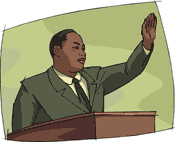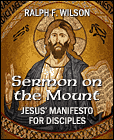
|
Old Testament
New Testament
Gospels
Acts
Paul's Letters
General Letters
Revelation
Topical Studies
Beginning the Journey (for new Christians). en Español

|
Old Testament
New Testament
Gospels
Acts
Paul's Letters
General Letters
Revelation
Topical Studies

|
Home
Bible Studies
Articles
Books
Podcasts
Search
Menu
Donate
About Us
Contact Us
FAQ
Sitemap
 Dr. Martin Luther King, Jr. (1929-1968), US civil rights leader |
At that time, many people, especially in the South, took the relationship between whites and blacks for granted. They were not really cognizant of the terrible injustice towards blacks. I can remember traveling in the South in the early 60s seeing two drinking fountains: one labeled "white," the other "colored." Segregation of the races was the law of the land. Blacks were widely excluded from jobs, restaurants, clubs, schools, churches, etc.
King viewed this as moral injustice and aimed to change it. Instead of calling for violence against the white oppressors, as some black leaders did in the 70s, no inner cities were burned during Dr. King's watch. Instead he strongly and vigorously taught his followers to love their oppressors and to pray for them. The Civil Rights Movement was a prayer movement as well as a political movement. King and his followers were subjected to brutality, beatings, savage dogs, high pressure hoses but determined to love in spite of what their enemies did to them.
On November 17, 1957 in Dexter Avenue Baptist Church in Montgomery, Alabama, Dr. King gave a sermon entitled "Loving Your Enemies," using as his text Matthew 5:43-45.
He began,
"I want to turn your attention to this subject: 'Loving Your Enemies.' It's so basic to me because it is a part of my basic philosophical and theological orientation -- the whole idea of love, the whole philosophy of love."
First, Dr. King outlined three ways to go about loving your enemies:
- Look within yourself to realize that you are not perfect, and something you have done might have sparked their hatred,
- Discover the element of good in your enemy, and
- When the opportunity presents itself for you to defeat your enemy, that is the time that you must not do it.
Then he considered the reasons why you should love your enemies:
- Hate only intensifies the existence of hate and evil in the universe,
- Hate distorts the personality of the hater, and
- Love has within it a redemptive power.
Finally, King concluded that oppressed people faced three choices:
"One of them is to rise up against their oppressors with physical violence and corroding hatred. But, oh, this isn't the way. For the danger and the weakness of this method is its futility. Violence creates many more social problems than it solves...."
"Another way is to acquiesce and to give in, to resign yourself to the oppression.... But that too isn't the way because non-cooperation with evil is as much a moral obligation as is cooperation with good.
"But there is another way. And that is to organize mass non-violent resistance based on the principle of love. It seems to me that this is the only way as our eyes look to the future. As we look out across the years and across the generations, let us develop and move right here. We must discover the power of love, the power, the redemptive power of love. And when we discover that we will be able to make of this old world a new world. We will be able to make men better. Love is the only way. Jesus discovered that...."
"There is a little tree planted on a little hill and on that tree hangs the most influential character that ever came in this world. But never feel that that tree is a meaningless drama that took place on the stages of history. Oh no, it is a telescope through which we look out into the long vista of eternity, and see the love of God breaking forth into time. It is an eternal reminder to a power-drunk generation that love is the only way. It is an eternal reminder to a generation depending on nuclear and atomic energy, a generation depending on physical violence, that love is the only creative, redemptive, transforming power in the universe....
"We will be able to matriculate into the university of eternal life because we had the power to love our enemies, to bless those persons that cursed us, to even decide to be good to those persons who hated us, and we even prayed for those persons who despitefully used us."
 Sermon on the Mount: The Jesus Manifesto is available in paperback and ebook formats |
Dr. King concluded in prayer:
"Oh God, help us in our lives and in all of our attitudes, to work out this controlling force of love, this controlling power that can solve every problem that we confront in all areas. Oh, we talk about politics; we talk about the problems facing our atomic civilization. Grant that all men will come together and discover that as we solve the crisis and solve these problems -- the international problems, the problems of atomic energy, the problems of nuclear energy, and yes, even the race problem -- let us join together in a great fellowship of love and bow down at the feet of Jesus. Give us this strong determination. In the name and spirit of this Christ, we pray. Amen."
Copyright by Estate of Martin Luther King, Jr., Atlanta, Georgia.
Copyright © 2026, Ralph F. Wilson. <pastor![]() joyfulheart.com> All rights reserved. A single copy of this article is free. Do not put this on a website. See legal, copyright, and reprint information.
joyfulheart.com> All rights reserved. A single copy of this article is free. Do not put this on a website. See legal, copyright, and reprint information.


 To be notified about future articles, stories, and Bible studies, why don't you subscribe to our free newsletter, The Joyful Heart, by placing your e-mail address in the box below. We respect your
To be notified about future articles, stories, and Bible studies, why don't you subscribe to our free newsletter, The Joyful Heart, by placing your e-mail address in the box below. We respect your